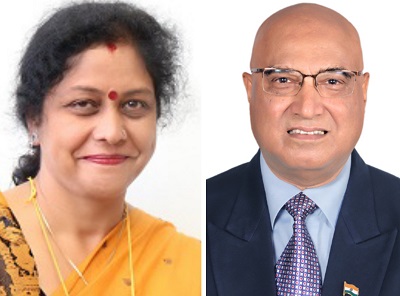(Asian independent)
Professor Rashmi Bhardwaj* & Professor Madan Mohan Goel**
As the world commemorates the 133rd birth anniversary of Bharat Ratan Dr. B.R. Ambedkar on April 14, 2024, it is imperative to shed light on his lesser-known role as a distinguished economist to be known as a Needonomist. Beyond his renowned stature as a champion of scheduled castes and one of the architects of India’s constitution, Ambedkar’s insights into economics hold profound relevance for global economies, especially in times of crisis with butterfly effect- a small change at one place in a complex system can have large effects elsewhere in the world to reduce if not remove the panic and fear of the global economic crisis.
Ambedkar deserves to be known to the World as an outstanding economist with recognition more than a noble prize in economics. The unique aspect of his scientific mind is evident in various memoranda and statements that he submitted to the Government of India from time to time are indicative of the fact that he had mastered the subject of economics to a great extent.
Ambedkar’s academic journey, culminating in a Doctorate of Science from the London School of Economics, underscores his wisdom as a Needonomist. His contributions to economic thought transcend borders and ideologies, offering timeless wisdom that resonates even today.
For reducing panic and fear of any crisis in any economy of the world, it would be relevant to adopt the canons of public expenditure advocated by Ambedkar. In 1949, Ambedkar said that every Government should spend the resources garnered from the public not only according to rules, laws and regulations but should also see that ‘faithfulness, wisdom and Economy’ are adhered to in the acts of expenditure by public authorities.
His canons of public expenditure advocate for a judicious and principled approach to government spending falling in the domain of needonomics (economics of needs), these principles serve as a guiding light for policymakers worldwide.
The remarkable thing about Ambedkar’s canons of public expenditure is Faithfulness, Economy, Wisdom (FEW) that they are ism-neutral. One can follow a policy of a large or small public sector and yet the principles behind these canons are applicable.
First, the cannon of faithfulness, faith in this context as defined by the dictionary a ‘duty or commitment to fulfil a trust, promise…’ The canon of faithfulness underscores the importance of politicians in power and opposition honouring the trust bestowed upon them by the electorate. It emphasizes a commitment to the original intentions of the people, ensuring accountability and integrity in governance as needo-governance more than the claim of good governance.
Economy, the second canon, goes beyond mere thriftiness, advocating for the intelligent allocation of resources to maximize their impact. Ambedkar’s vision of the economy transcends frugality, focusing instead on the efficient utilization of funds to achieve societal well-being. Economy in public expenditure does not simply mean a low level of public spending but is the intelligent use of funds so that every rupee is beneficial and worth its purchasing power which is otherwise declining day by day.
Wisdom, as the third canon, highlights the necessity of informed decision-making in public expenditure as commonsense is a symptom of wise Government. Beyond mere adherence to rules, Ambedkar stresses the importance of prudent and sagacious choices guided by economic expertise and foresight. In the context of a just utilization of public funds, the economic wisdom of the academic professional outside Delhi Durbar becomes a paramount necessity.
The apparent faithfulness to the intentions, wisdom not sufficient in themselves for public expenditure.
Ambedkar’s canons offer a flexible framework adaptable to diverse economic contexts. They urge policymakers to align expenditure decisions with overarching objectives and available resources while ensuring efficiency and effectiveness. The allocation of expenditure among competing demands and the manner of utilization fall within the domain of these canons.
In an era marked by global economic uncertainty, Ambedkar’s canons serve as a beacon of rationality and prudence. They provide a touchstone for evaluating the necessity and efficacy of public expenditure, fostering transparency and accountability in governance. Every single decision should be assessed in terms of faithfulness to the will of the people; wisdom as provided by the professionals in the field, coupled with well-considered and honest judgment in execution.
As the world pays homage to Ambedkar’s multifaceted legacy, it is incumbent upon us to recognize his seminal contributions to economics. Beyond being a revered figure, he emerges as an unsung hero of economic thought, deserving of recognition commensurate with his profound impact on the world stage.
In honouring Ambedkar as a Needonomist—a term coined by Professor Madan Mohan Goel as the propounder of the needonomics school of thought to reflect his economic acumen—we not only pay tribute to his intellectual legacy but also imbue his principles into the fabric of global economic discourse. Let us commemorate his birth anniversary by embracing his timeless wisdom and applying it to navigate the challenges of an ever-evolving world.
*The first author is a Fellow of the Institute of Mathematics & Applications, UK; Professor of Mathematics, Nonlinear Dynamics Research Lab, University School of Basic & Applied Sciences, Guru Gobind Singh Indraprastha University, Delhi
** The second author is Propounder Needonomics School of Thought, Former Vice-Chancellor, Starex University, Jagannath University, RGNIYD (GOI), and Superannuated Professor of Kurukshetra University.








